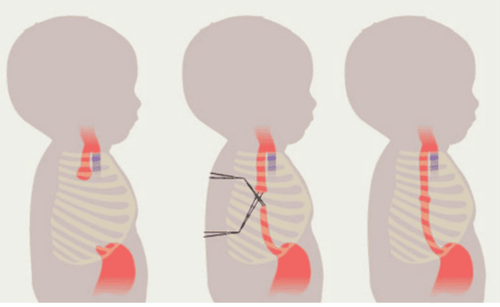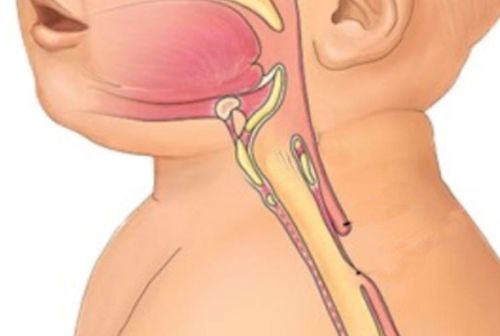This is an automatically translated article.
The article is professionally consulted by Master, Doctor Nguyen Hoang The Nhan - Department of Pediatrics - Neonatology - Vinmec Nha Trang International General Hospital.Causes of acute respiratory failure in infants can originate from the lungs, such as endocardial disease, aspiration of amniotic fluid, pneumonia or extrapulmonary, such as esophageal atrophy, congenital heart disease.
1. Acute respiratory failure in infants
Neonatal acute respiratory failure, also known as endocardial disease, usually appears hours or days after normal breathing after birth. The disease occurs mainly in premature infants, the incidence increases with weight and duration of the disease, specifically as follows:
Clinical symptoms of acute respiratory failure in infants are sudden severe dyspnea, rapid breathing rate > 60 breaths/min, or apnea lasting > 20 s or apnea < 20 s with a decrease in heart rate < 100 beats/min, groaning, chest indrawing, skin cyanosis, increasing expression. After only a few hours of rapid breathing, the child will have signs of suffocation, weakness, fatigue, slow breathing, then stop breathing and die.
1.1 Development of acute respiratory failure in infants
Stage 0 - 5 hours after birth: The baby is still breathing normally. After 5-10 hours: The child shows signs of acute respiratory failure, rapid breathing, accompanied by signs of blood gas disturbances. From 10 to 24 hours: The child begins to be exhausted, has slow breathing, appears metabolic disorders, severe acidosis. After 24 hours: Risk of death if the child does not receive ventilatory support during respiratory failure. With good respiratory care, the disease will recover within a week.
1.2 Causes of acute respiratory failure in infants
Causes of acute respiratory failure in neonates are mainly related to the following factors:
Premature babies: Increased pulmonary capillary permeability, causing extravasation of blood cells and plasma into the alveoli. After the alveolar fluid is drained by the lymphatic route, the alveolar lumen contains many red blood cells and fibrin. Prenatal asphyxia: Alveolar cells are deprived of oxygen and cannot produce surfactant, a surfactant. Therefore, after a period of normal breathing, the child will have a lack of surfactant due to many collapsed alveoli, causing respiratory failure. At that time, the child tries to inhale but the air cannot come in because the alveoli have collapsed. Amniotic fluid aspiration syndrome: Children with amniotic fluid aspiration syndrome often have a very poor prognosis. The baby had respiratory failure soon after birth. The reason is that the baby is asphyxiated to the fetus, so the baby has breathing movements early before birth and accidentally inhales amniotic fluid. At birth, the baby is suffocated, pale, nose and mouth full of amniotic fluid, sometimes infected with meconium. Pneumonia: Pneumonia usually occurs in the first 3 hours after birth due to infection of the fetus. Severe disease, often accompanied by bacteremia, systemic infection. Some other causes such as: esophageal atresia, congenital heart disease, left ventricular insufficiency, problems in the ductus arteriosus. Diaphragm hernia, meningeal hemorrhage. The diseases mentioned above are also capable of causing breathing disturbances and apnea in infants. Therefore, when detecting abnormal signs, it is necessary to quickly handle them to limit dangerous complications.

Hội chứng suy hô hấp cấp ở trẻ sơ sinh có thể đe dọa đến tính mạng nếu không được xử trí kịp thời
2. Why should children be examined for acute respiratory failure at Vinmec International General Hospital?
Vinmec International General Hospital is currently a prestigious address for examination, diagnosis and treatment of acute respiratory failure, trusted by many parents as a place to send and take care of their children's health. love.
At Vinmec International General Hospital, there is a team of experts, pediatricians, pharmacists and nurses with high qualifications, good expertise, lots of experience, especially dedicated and professional attitude.
With the full support of many modern technical means, Vinmec International General Hospital ensures to provide the most comprehensive and effective health care services, exclusively for children.
At Vinmec Hai Phong and Vinmec Nha Trang, the Surfactant pump technique is applied in the treatment of respiratory failure in preterm infants due to primary surfactant deficiency in premature infants causing respiratory distress syndrome in premature infants. Surfactant therapy is indicated for pediatric patients ≤ 26 weeks when FiO2 > 0.30 and for pediatric patients > 26 weeks requiring FiO2 > 0.40.
Surfactant pumping technique will be difficult to perform if the general standard of care is not of high quality. Vinmec has met the strict criteria to apply Surfactant Therapy in the treatment of respiratory failure in infants, including a full range of supportive facilities and a team of doctors who are proficient in the following techniques: Intubation, use of ventilators, treatment of respiratory and circulatory emergencies, treatment of pediatric patients with pneumothorax.
For more detailed information about Surfactant pump technology to treat neonatal respiratory failure at Vinmec, customers can register for an online examination HERE, or contact the hotlines of hospitals at the address:
General Hospital Vinmec International Department Hai Phong : 0225 7309 888
Vinmec Nha Trang International General Hospital : 0258 3900 168
Please dial HOTLINE for more information or register for an appointment HERE. Download MyVinmec app to make appointments faster and to manage your bookings easily.













